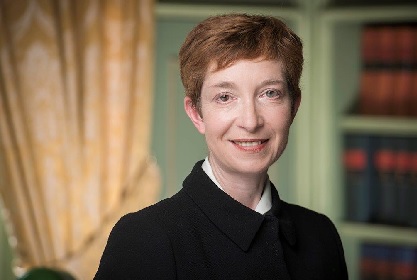Celebrating women who ‘break the bias’
07 Mar

Ruth Crawford QC, Treasurer, Faculty of Advocates
INTERNATIONAL Women’s Day, which takes place tomorrow, gives us all the opportunity to recognise the contribution women make in the workplace and throughout society as a whole.
This year’s theme is to ‘break the bias’ and to work towards a world where women are valued and celebrated. And there’s a strong case for doing so within the workplace. A study on workplace diversity by the Massachusetts Institute of Technology (MIT) illustrated that when offices are split evenly along gender lines, revenues can go up by as much as 41%. Organisations with diverse teams made better business decisions.
According to the report, women also show high levels of emotional intelligence, empathy, and communication skills. These are all pillars of a good business: so this provides a strong rationale, and an appropriate opportunity, to tackle gender imbalances in the workplace, not least in the Faculty of Advocates.
All of us suffered due to the restrictions imposed by COVID-19. These restrictions put harsh demands on women with children and with other caring responsibilities. Research shows that, while lockdowns affected everyone, they impacted more heavily on women’s wellbeing, mental health and financial stability.
The Faculty of Advocates is acutely aware of the need to promote and encourage diversity within its membership base. Such diversity reflects the population it serves in its pursuit of justice for all those who live and work in Scotland. Our fair instruction policy recognises that advocates should be instructed based on their skills, experience, and ability. We have internal procedures in place to ensure that, where work requires to be allocated, it is allocated fairly and without discrimination on grounds of age, disability, gender, race, religion or belief, or sexual orientation. We periodically review work allocation to ensure these procedures, and the principles that underpin them, are observed.
For some time, the Faculty has encouraged and promoted diversity among newer members by providing scholarships to those wanting to train as devils and then practice as Advocates at the Bar. Our Lord Hope, Faculty, and SCLR Scholarships all aim to improve accessibility to the Bar. Applicants must demonstrate sufficient ability to merit an award, but greater weighting is given to those in financial need or to those from groups currently under-represented.
Our outreach programmes at schools and higher education institutions encourage young women to consider a career at the Bar. We also provide sponsorships for events that cover issues of particular relevance to women. Female advocates are represented within our top leadership structures and we are immensely proud of the many inspirational women who belong to Faculty. These women are stellar examples of what women can achieve within the legal system. They are all, whether consciously or unconsciously, ‘breaking the bias’ and proving the benefits of gender balance.
It is perhaps invidious to single out any one individual but, last year, Faculty was delighted by the appointment of Dorothy Bain QC as Lord Advocate and Ruth Charteris QC as Solicitor General. This marks the first time in Scottish legal history that both law officers have been women. To add to that landmark, we also applaud Ashley Edwards QC, who was recently appointed principal Crown Counsel leading the team of Advocates Depute prosecuting serious crime. We also congratulate her assistant, Susanne Tanner QC.
These appointments are a timely recognition of the fact that women can and do succeed in the law. Last week also saw the unveiling of a portrait of Lady Dorrian, which the Faculty commissioned to mark her elevation as the first woman Lord Justice Clerk.
Progress is being made on gender imbalance. The rate of change here may not be as fast as some might hope, but events such as International Women’s Day help to prompt further efforts and to recognise the strong and continuing contribution of women to the wider interests of justice. As women, each of us can play our part by choosing to be ‘visible’, making sure we are heard and that our achievements are recognised.
The Bar is best served by a wide range of diverse views and approaches. I would encourage all with an interest or career in the law to work hard, recognise your ability, and be confident of your own identity as women and your independence of mind.
Finally, please develop a professional and support network. There are plenty of us here to help. This will prove indispensable, both to celebrate your personal successes and to support you when things do not go the way you had hoped.
This column by Ruth Crawford QC, Treasurer, Faculty of Advocates, first appeared in The Scotsman here